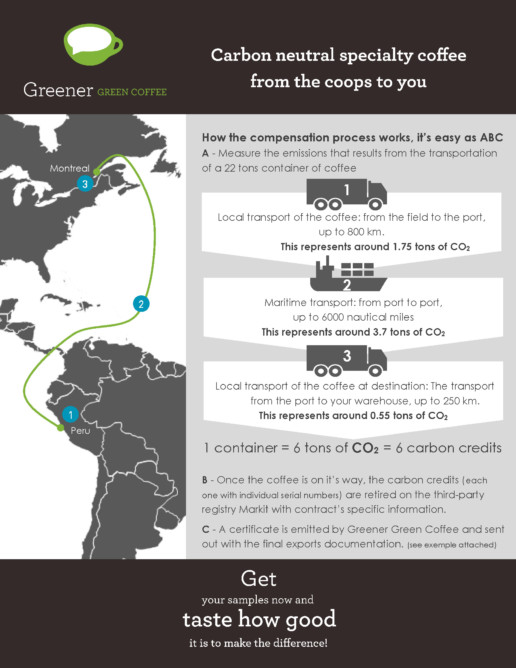Ken Gabbay Coffee Ltd. and ECOTIERRA Announce Carbon Offset Project
Ken Gabbay Coffee Ltd., a leading Canadian green coffee importer is proud to announce a partnership with ECOTIERRA to offset carbon emissions for the transportation of the coffees purchased from Peru. This partnership brings together Ken Gabbay Coffee Ltd., with its ongoing commitment to sustainability in the coffee industry, and ECOTIERRA, a sustainable agroforestry project developer based in Canada and Peru, in a project that is protecting a total of 500,000 hectares of Amazonian forest.
“ECOTIERRA has calculated that every container of coffee emits 6 tons of CO2, which includes the local transport at origin, the maritime transport and the local transport at destination” says Alvin Suissa, Vice-President of Ken Gabbay Coffee Ltd. “Our intention is to offset all emissions related to the transportation of all our coffee imported from Peru. Once implemented, our goal is to apply this type of project to other origins as well.”
The carbon credits used to offset the emissions are coming from a project located in the Madre de Dios region of Peru. The protected forests there counts thousands of native Brazil nut trees which have been harvested by generations of local producers. The project known as REDD, Reducing Emissions from Deforestation and Forest Degradation (REDD), allows for the protection of the rainforest while promoting a sustainable agricultural practice involving the forest. The REDD project in Brazil nut concessions is protecting an area of the Amazonian forest equivalent to more than ten times the Island of Montreal.
The REDD project is validated by the Verified Carbon Standard and by the Climate, Community & Biodiversity Alliance. The VCS standard highlights the quality of the carbon offset while the CCBS focuses on the positive impact on the climate, local population and the biodiversity.
ABOUT ECOTIERRA
ECOTIERRA (https://www.ecotierra.co/) is a developer of forestry and agro-forestry projects which bring considerable socio-economic and environmental benefits. Its success comes from a commitment to building strong and sustainable partnerships, encouraging corporate responsibility and ethical sourcing, and utilizing the benefits of carbon finance to optimize the value chain and ensure sustainable landscape management.
